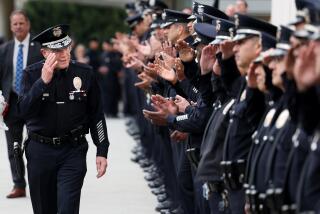Man Takes a Shine to a New Career
- Share via
Everyone at the Los Angeles Police Department knows there has been a regime change, even the shoeshine man.
Although former Police Chief Bernard Parks had insisted on a spit shine, the new chief, William J. Bratton, “said it was OK if we go back to a ‘leather luster,’ ” said Harvey Burton, as he blackened a pair of loafers in the back hallway of Hollywood Station.
The affable 60-year-old in a trademark derby hat, called “the best shine-ologist in L.A.” by Hollywood Det. Jeff Childs, disapproves of leather luster.
The treatment, achieved by preparing the leather with an acetone cleaner and applying black lacquer, may look smart at first, Burton explained. But it cracks as the body flexes.
Burton prefers to go old school: cleaning shoes with alcohol, brushing on new dye, massaging in wax polish, coating them with his special potion that quickly evens out the polish, cleaning up the edges, and buffing the shoes to a Cadillac gleam.
“Having unshined shoes is like wearing clip polyester ties,” Burton said, wagging his graying beard.
Burton’s philosophy resonates with LAPD officers. Det. Carol Hughes, who takes her stack-heel oxfords and lace-up work boots to Burton once every two weeks, said, “You do it to look sharp, for professionalism and confidence. The LAPD has always prided itself on being the best dressed police officers.”
Hollywood is one of eight division stations that has a shine man. (Seven other stations have an impersonal buffing machine. Three have neither.)
On a recent day, Senior Lead Officer Michael D. Shea settled into the tweed-covered chair on Burton’s shine stand, across from the equipment room and the coffee machine.
“The last two days we went out to do bulky item trash pickup with Sanitation,” Shea said. “That took whatever shine there was off of them.”
Burton has been at Hollywood Station since March, plunging into work at a time when eager cops wanted to impress at the annual inspection.
His average four-day work week at the station earns him $100 to $200. On weekends, Burton works at Star Shoes, a shoe-themed bar in Hollywood, where much of the trade involves polishing women’s knee-high boots. He pocketed $146 on a recent weekend.
Burton, who shares a 1970 motor home with Ginger, his Austrian pinscher, says he gets by on these modest earnings. The self-titled “upper-middle-class homeless man” whose address is “near Vermont [Avenue] and Beverly [Boulevard],” even has spending money, having recently acquired a maroon 1986 Honda Civic for himself and a 1930s topaz ring for a cocktail waitress friend.
But Burton confronted a stark choice in 1998 when he settled down in Hollywood after he had tried several lines of work, including cooking, unloading trucks, and peddling fruits and vegetables.
“It was either shining shoes or going into recycling. And that didn’t appeal to me,” he said. “Shining shoes gets you $3 plus $1 tip. That’s $4. For $4, you’d have to find 100 cans.”
“Plus,” Burton added, rubbing the toe of a boot with his blackened finger, “you stay cleaner shining shoes.”
So he constructed a shine box from a cupboard and packed it full of polishes, creams, cleaners, rags and horsehair brushes. Using skills he first learned as a high school student in Escondido, Burton plied his trade at outdoor stands, well-known shine parlors and insurance company offices.
Four years later, Capt. Michael Downing brought him into the Hollywood station after an officer spotted the shine man’s good work. Now, pairs and pairs of shoes queue up for their turn under Burton’s able hands.
Yet, Burton, like Horatio Alger’s bootblack Ragged Dick, believes hard work is rewarded.
“This is an incredible business,” he said. “You can survive on it and keep your dignity. You make money, get up and do your own thinking.” Burton has even distributed free bottles of his own special shoe potion at swap meets to help homeless entrepreneurs.
But he acknowledged the industry lacks luster.
“The shoe shine business is not an up and coming business,” Burton said with a wry grin.
“Most shine stations are now in basements or underpasses. They’re hidden. Before, they’d be out at the Greyhound [bus] stations, or on the streets. On Saturdays, people used to get their hair done, and their shoes shined for dancing Saturday night.”
He lamented the decline of “the good polishes with the cancer-causing chemicals,” faulting the rise of sport shoes and relaxed office dress codes.
Luckily, Burton added, police officers still value impeccably burnished leather.
“Officers are very competitive,” he said. “They’re extremely professional and when they walk into a room of men, they don’t want anyone to look more professional than they do.”
Burton nodded toward an officer whose shoes, belt and holster gleamed like a polished floor. “He knows that other officers can see that.”
More to Read
Sign up for Essential California
The most important California stories and recommendations in your inbox every morning.
You may occasionally receive promotional content from the Los Angeles Times.












